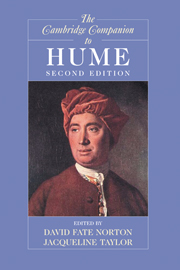Book contents
- Frontmatter
- 1 An Introduction to Hume’s Thought
- 2 Hume’s New Science of the Mind
- 3 Hume and the Mechanics of Mind: Impressions, Ideas, and Association
- 4 Hume’s Theory of Space and Time in Its Skeptical Context
- 5 Hume on Causation
- 6 Hume and the Problem of Personal Identity
- 7 Hume’s Skepticism
- 8 Hume’s Moral Psychology
- 9 The Foundations of Morality in Hume’s Treatise
- 10 Hume’s Later Moral Philosophy
- 11 The Structure of Hume’s Political Theory
- 12 Hume’s Principles of Political Economy
- 13 Hume on the Arts and “The Standard of Taste”: Texts and Contexts
- 14 David Hume: “The Historian”
- 15 Hume on Religion
- Appendix: Hume’s Autobiographies
- Selected Bibliography
- Index
- Series List
12 - Hume’s Principles of Political Economy
Published online by Cambridge University Press: 28 May 2009
- Frontmatter
- 1 An Introduction to Hume’s Thought
- 2 Hume’s New Science of the Mind
- 3 Hume and the Mechanics of Mind: Impressions, Ideas, and Association
- 4 Hume’s Theory of Space and Time in Its Skeptical Context
- 5 Hume on Causation
- 6 Hume and the Problem of Personal Identity
- 7 Hume’s Skepticism
- 8 Hume’s Moral Psychology
- 9 The Foundations of Morality in Hume’s Treatise
- 10 Hume’s Later Moral Philosophy
- 11 The Structure of Hume’s Political Theory
- 12 Hume’s Principles of Political Economy
- 13 Hume on the Arts and “The Standard of Taste”: Texts and Contexts
- 14 David Hume: “The Historian”
- 15 Hume on Religion
- Appendix: Hume’s Autobiographies
- Selected Bibliography
- Index
- Series List
Summary
David Hume's essays were “the cradle of economics,” suggested John Hill Burton, in his important biography of Hume. Although this may be a biographer's exaggeration, there can be no doubt that Hume's work provided an important contribution to political economy as a discipline, together with a significant critique of the “mercantile” system that was later attacked by his friend Adam Smith.
ECONOMICS: THE BACKGROUND
Mercantilism is difficult to define. As the historian P.J. Thomas put it: “Mercantilism has often been described as a definite and unified policy or doctrine, but that it has never been. In reality it was a shifting combination of tendencies which, although directed to a common aim - the increase of national power - seldom possessed a unified system of policy, or even a harmonious set of doctrines. It was a very complicated web of which the threads mingled inextricably.” In the seventeenth and eighteenth centuries the object of policy was the enhancement of the power of the nation state, a strategy that was to be attained in a number of ways, at least one of which was economic. The power of this state was to be enhanced by the accumulation of treasure through trade, the maximization of employment, and the encouragement of population growth.
- Type
- Chapter
- Information
- The Cambridge Companion to Hume , pp. 381 - 413Publisher: Cambridge University PressPrint publication year: 2008
- 4
- Cited by



